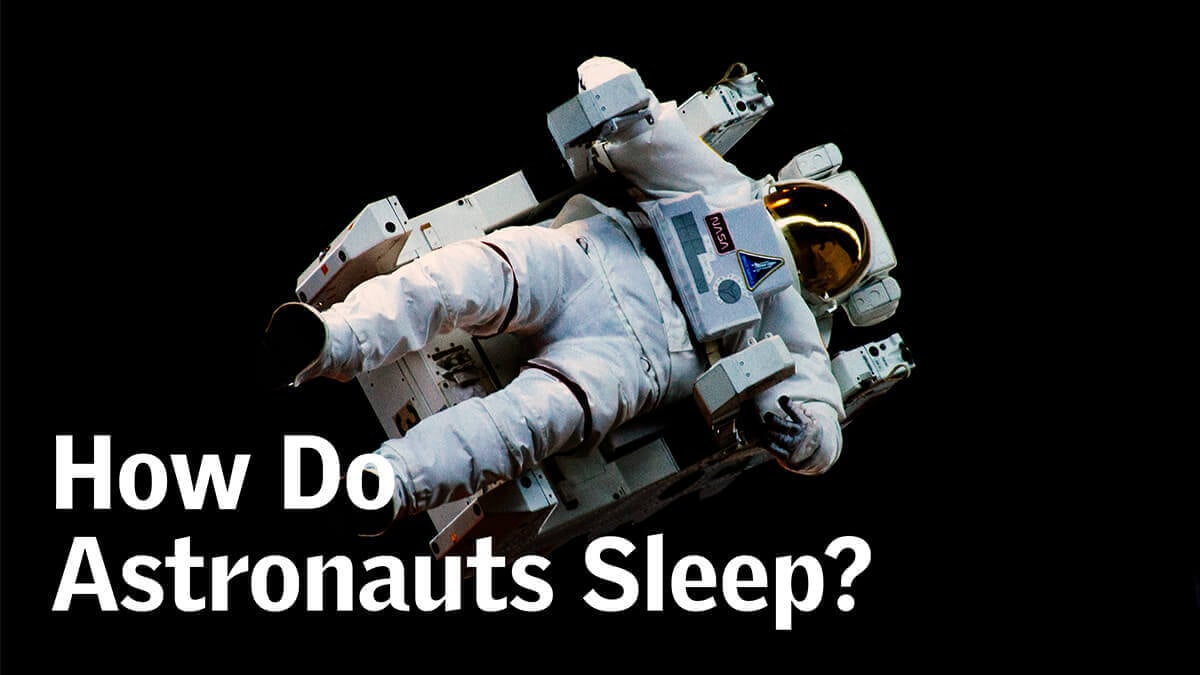Maybe, during a moment of boredom, you’ve wondered what sleeping in space is like. Today, we have all the answers to your questions about astronaut sleep, so you can picture just what it’s like for those sleeping in a Blue Origin or SpaceX machine.
- What Is Sleeping in Space Like?
- Do Astronauts Actually Get A Good Night’s Sleep?
- What Causes Problems with Astronaut Sleep?
- Improving Sleep for Astronauts
- Where Does A Weighted Blanket Come Into Play?
What Is Sleeping in Space Like?
So, how does an astronaut sleep? You may be surprised to learn that sleeping in space isn’t entirely different from sleeping down on land. In fact, according to NASA, astronauts set aside 8 hours for sleep at night, just like the typical working person. Just as people may wake up at night to use the bathroom while at home, astronauts may do this as well.
What is different about astronaut sleep is that while in outer space, astronauts are actually weightless, so they can sleep in any position. The only problem is that their bodies would float around if not attached to something, which could cause them to bump into something and get injured. To protect themselves, astronauts typically sleep in sleeping bags, inside tiny cabins that are just big enough for one person
Do Astronauts Actually Get A Good Night’s Sleep?
While astronauts set aside 8 hours per night for sleep just like we do back on earth, sleep in space may not always be restful. In fact, NASA is aware of the fact that sleep disturbances can occur during space flight, and astronauts therefore receive training on how to get the best sleep possible while in space.
This sleep training is necessary, as, according to research, there is evidence that astronauts frequently do not get enough sleep. Their sleep duration tends to be lower while in space, and REM sleep in particular tends to be reduced when sleeping in space. Studies also suggest that astronauts often use sleeping pills during spaceflight, but pills like melatonin have not been found to be effective for increasing sleep time.
What Causes Problems with Astronaut Sleep?
Given the fact that research has shown that sleep deprivation can occur during space flights, scientists have taken an interest in what causes poor sleep quality in astronauts. A study in the American Journal of Physiology found that astronauts’ circadian rhythm is thrown off during space flights, because there can be a low level of light in various areas of the spacecraft. This means that the body can become confused about when it’s daytime and when it is time for sleep.
These circadian rhythm disturbances come with a consequence. The study referenced above found that astronauts tended to sleep only 6.5 hours per day, and they reported poor sleep quality. Their performance also diminished, suggesting that sleep disturbances were quite risky.
Improving Sleep for Astronauts
What can be done to address poor sleep in space? It turns out that NASA is in favor of promoting healthy sleep in its astronauts, especially given the fact that sleep deprivation in space can lead to dangerous errors and health problems. NASA has taken the following steps to improve astronaut sleep:
- Instituting strict sleep schedules for astronauts to allow their bodies to develop a rhythm
- Providing training and education on healthy sleep
- Providing private sleeping environments that use restraints to prevent astronauts from floating around while asleep and take the ideal sleeping temperature into consideration
- Changing the lighting on spacecraft to promote alertness during the day
- Offering cognitive therapy to help astronauts develop healthier sleep routines
- Providing medical intervention if other methods for improving sleep are not effective
Where Does A Weighted Blanket Come Into Play?
Using a weighted blanket while sleeping in space may not be feasible, given the specific sleeping arrangements, including a sleeping bag and restraints, that have to be used while on a spacecraft. That being said, astronauts may struggle with sleep for a period when they return home, as their circadian rhythms can be disrupted, and it takes time for the body to adjust to the old environment.
An Aricove weighted blanket can be the perfect tool for getting a better night of sleep. We offer a weighted blanket of 20 lbs to suit larger adults, as well as a variety of other weights to meet each individual need. Our blankets are made from premium bamboo fabric, which is naturally cooling and moisture wicking to keep you comfortable throughout the night.


 United States (USD $)
United States (USD $)